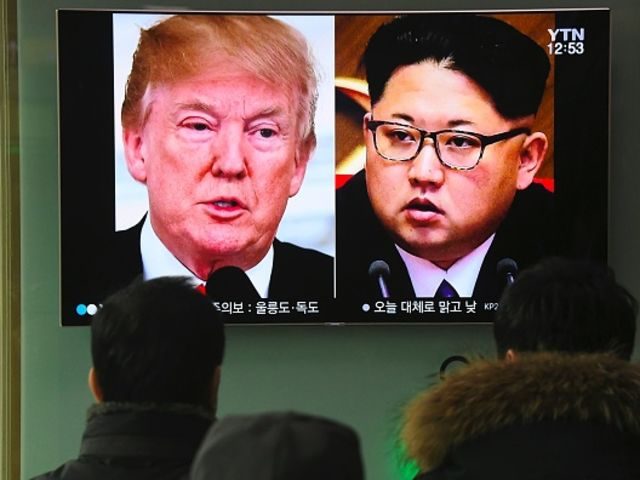Rodong Sinmun, the state newspaper of North Korea, condemned the United States as the “worst human rights abuser” in the world in an editorial Wednesday protesting the State Department’s recent report on the status of human rights around the world.
As dictator Kim Jong-un prepares for summits with South Korean President Moon Jae-in and American President Donald Trump, expected to lower tensions between the rogue communist state and the world generally, Rodong Sinmun and other North Korean state outlets have shifted their focus away from attacking Trump and Moon personally towards condemning U.S. “culture.” Prioritizing respect for human rights and the free pursuit of happiness is paramount on the list of American values that North Korean outlets condemn as “cultural poisoning.”
In the column published Wednesday, Rodong Sinmun protests that the U.S. State Department “every year acts as if it were a ‘human rights judge'” and condemns countries that fail to meet American standards. In its 2017 human rights reports, released last week, the State Department took to “viciously slandering the DPRK [North Korea] for its ‘human rights issue,'” according to Rodong.
“By nature, the U.S. is the worst human rights abuser with neither justifications nor face to talk about human rights of other countries,” the newspaper protested, adding:
For the U.S. to take issue with “human rights” issue [sic] in other countries and make profound confusing [sic] of the right and the wrong while shelving the hideous human rights performance in its own country, where all sorts of injustice, deprivation of rights and social evils stalk, is a wanton distortion of genuine human rights and an intolerable challenge to international justice and conscience.
Rodong Sinmun claims the United States suffers a “cancer-like” spread of gun-related violence and should “mind its own hideous human rights issue” before criticizing North Korea. It goes on to argue that the United States has no interest in human rights, but “its true aim is to disintegrate those countries which are disobedient to it and to create a pretext for political, military and economic aggression and pressure.”
According to the government publication, North Korea is “the most advantageous, dignified and cradle of genuine life of working people in the world.”
This column is the second published this week that belies panic within Kim Jong-un’s regime that American values and culture are contagious, and any opening up to the Trump administration may trigger a demand for greater freedoms within the repressive country. On Monday, the newspaper warned that “the U.S. ideological and cultural poisoning is a vicious aggressive move to paralyze the sound ideological consciousness of the people and realize the regime change after all.”
Rodong Sinmun‘s Monday column went on to argue that heeding the appeal of free American culture would lead to “mental and moral ruin of human being [sic] or the ideological and cultural ruin of the nation.”
The newspaper noted that “ideological and cultural poisoning” was now “playing the leading role in aggression” against North Korea, hinting at President Trump’s willingness to dialogue politically with Kim.
North Korean publications have mentioned potential “dialogue” with the United States but have not explicitly stated that Kim has planned a meeting with Trump for late May or early June. As state media are the only publications allowed in North Korea, this suggests that the average North Korean is not aware of Kim’s extending an invitation to Trump and the latter accepting.
In its 2017 report, published last week and triggering the Rodong Sinmun backlash, the U.S. State Department confirmed that North Korea still employs a variety of cruel and violent practices against its people, including:
extrajudicial killings; disappearances; arbitrary arrests and detentions; torture; political prison camps in which conditions were often harsh, life threatening, and included forced and compulsory labor; unfair trials; rigid controls over many aspects of citizen’s lives, including arbitrary interference with privacy, family, home, and correspondence, and denial of the freedoms of speech, press, assembly, association, religion, and movement; denial of the ability to choose their government; coerced abortion; trafficking in persons; severe restrictions on worker rights, including denial of the right to organize independent unions and domestic forced labor through mass mobilizations and as a part of the re-education system.
Public executions were reportedly common, according to statistics from interviews with North Korean refugees, and reasons for being executed could include anything from “sleeping during patriotic events” to sharing details about life in North Korea with the outside world.
North Korea’s government, the State Department noted, also routinely engaged in infanticide, killing children “in cases of political prisoners, persons with disabilities, and where the mother was repatriated from China.” Some infants were killed in front of their mothers as punishment for perceived subversion.

COMMENTS
Please let us know if you're having issues with commenting.